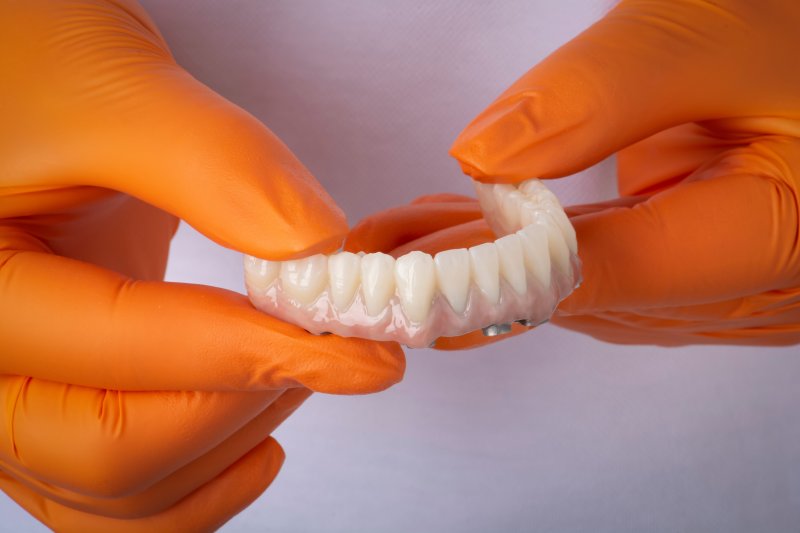
Sometimes, people need to replace missing teeth or teeth that will be extracted shortly. Bridges, dentures, and implants are the most common ways to accomplish this, but what are the differences?
The most common area of confusion lies between dentures and bridges. Dentures are removable: you take them out of your mouth. Bridges are permanent: you do NOT take them in and out.
Dentures can be made from several different materials: acrylic (plastic), metal, a combination of acrylic and metal, or “thermoplastic.” The advantages of acrylic include cost and simplicity. They are the least expensive, and the easiest to fabricate and repair. The disadvantages include thickness and low stability.
Metal dentures are thin, rigid, and fit tightly. The downsides include increased difficulty to repair (although not terribly difficult) and cost (they are the most expensive).
Thermoplastic materials have the advantage of being flexible, which many patients find to be more comfortable. However, repairs can be difficult to impossible, based upon the type of material utilized.
Unlike removable dentures, bridges are permanent. This is one reason bridges are more popular than dentures. Other advantages include increased biting/chewing power, increased esthetics, and less fuss with them since they don’t have to be taken in and out. Downsides include the “shaving down” of teeth on either side of spaces to keep them in place (called “abutment” teeth), and potential cavity development or need for root canals on these abutments over time.
Dental implants provide a host of options. Most people think of an implant as a post that is placed into the jawbone to hold a single tooth (crown). This is one use of an implant, but there are other functions. The implant is actually the post: you can use it to secure a denture or a bridge, also! Concerning dentures, the implant can help to eliminate or decrease the number of clasps, providing a more esthetic outcome and a more stable set of teeth. Bridges benefit from implants because now you cannot develop cavities around the abutments and there is no need for root canals. Implant bridges also eliminate the need for drilling on other teeth.
A very common substitute or replacement for large partial dentures and full dentures is “All-On-Four®.” This revolutionary technology provides the patient with permanent, non-removable teeth in just a few appointments. Gone is the stigma and disappointment of removable teeth and poor chewing ability. Patients instantly benefit from a strong bite, excellent smile, and freedom of re-gaining the roof of their mouths if they had a denture that covered it previously. Many patients who have dentures or require removal of most teeth present to Dr. Goldberg for this procedure specifically: he is a leading authority on this type of procedure within the community.
More information regarding this, and other topics, is available on our website.
About the Author
Dr. Ira Goldberg is a general dentist & implant expert with 29 years of experience. He is located in the Roxbury Mall in Succasunna, NJ. He provides general dentistry for the entire family, including cleanings, checkups, whitening, veneers, crowns, root canals, dentures, periodontal (gum) services, dental implants, and much more. He is a Diplomate of the American Board of Implantology/Implant Dentistry, holds multiple degrees, and is recognized as an expert in dental implants. You can find additional information on his website: www.morriscountydentist.com. The office can be reached at: (973) 328-1225 or via email: frontdesk.mcda@gmail.com.
